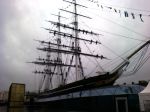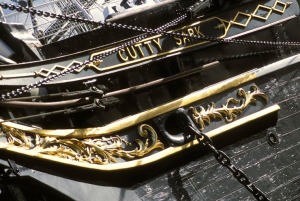Two ships, one hundred years apart. One of which is synonymous with loss and tragedy the other, perhaps hubris. But what is the enduring appeal of such destruction, why as we approach the century of the loss of the Titanic does it still resonate. At the last count 153 books had been published on her in the last month, and the television and radio filled with items on her. Is it that she was the microcosm of society, all classes equal before impending doom? Or as it turned out, some were more equal than others. If that is so, Costa Concordia will fade from the memory only to be resurrected when, and if, she is refloated and towed to what must be her final port; or when, as seems likely, her hapless Captain is brought to trial. Surely she will not endure as the Titanic, she is too classless, too egalitarian, albeit that money bought you a better view, and yes there were more life boats and emergency dinghies.
Is that what draws back class or is it the stoicism of a bygone era played out in that dark April night, the eerie fascination with how we, or others, would or will meet our end. Some such as the engineers and those of the stokeholds, amongst many others feverishly trying to stave off the inevitable. Still more seeking to save their loved ones, with little thought for themselves. And the few the very few who sought by all means to save only themselves. Such drama did not appear to have played out on the Costa Concordia, confusion there was a plenty, the tragic yes and the comic, in the blackest of humour, with her Captain tripping and falling into a lifeboat. Perhaps it is the human which draws us back.
Or perhaps in both cases it was the idea that this could not have happened. One was, nearly unsinkable, the other equipped with every aid to navigation known to 21st century seafaring. Yet both went down so there is plenty of room for us to insert our own thoughts and theories, there is space which we can fill with imaging and hypotheses surely stronger with that ship of hundred years ago. Impending doom became reality yet and 1,500 people died. Not so aboard Costa Concordia, the flickering images of mobile phones fill the void and most, but not all, survived. But it is not just a grisly body count nor a technical ‘how to sink a ship’ which draws us again and again to such things as with the Homeric tales, the events themselves pass from verifiable fact into mythic legend. Even Titanic’s name leads itself to such, not so the Costa Concordia. To be sure many lessons were learnt after the loss of Titanic in 1912 and no doubt lessons will be learnt in 2012. But in the end it is the Titanic story told and retold which has weaved its way into our consciousness, not so with the Costa Concordia. Perhaps that is the real tragedy that we have, or are endanger of, losing sight that in both cases lives were in peril, and in many cases lost, and myth and legend are a poor substitute for cold hard facts which might just keep seafarers and passengers alike alive.
Chris Ware, 12 April 2012



